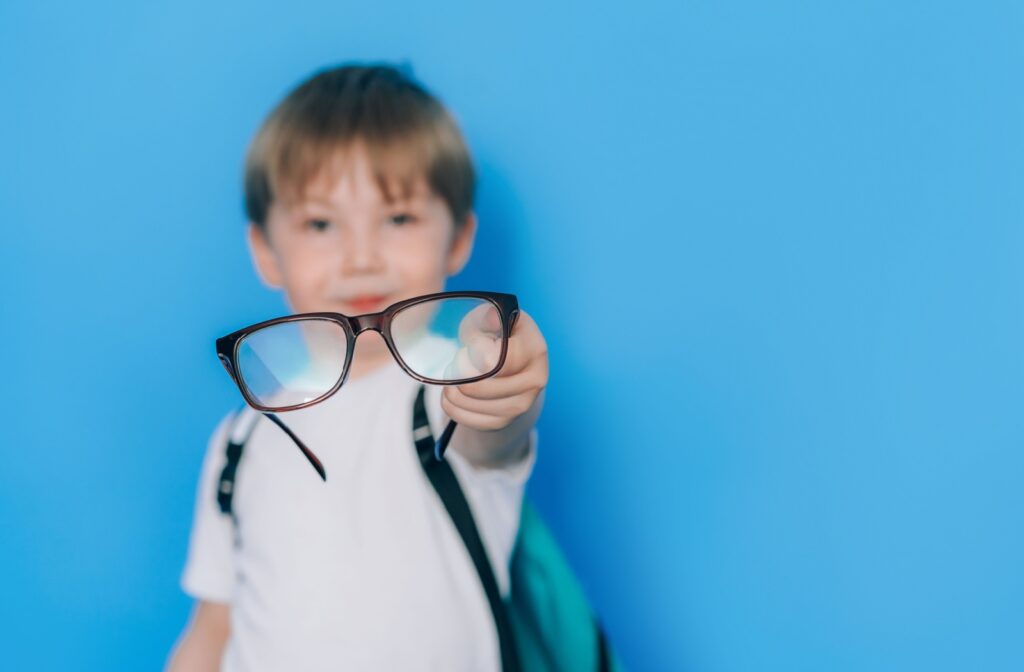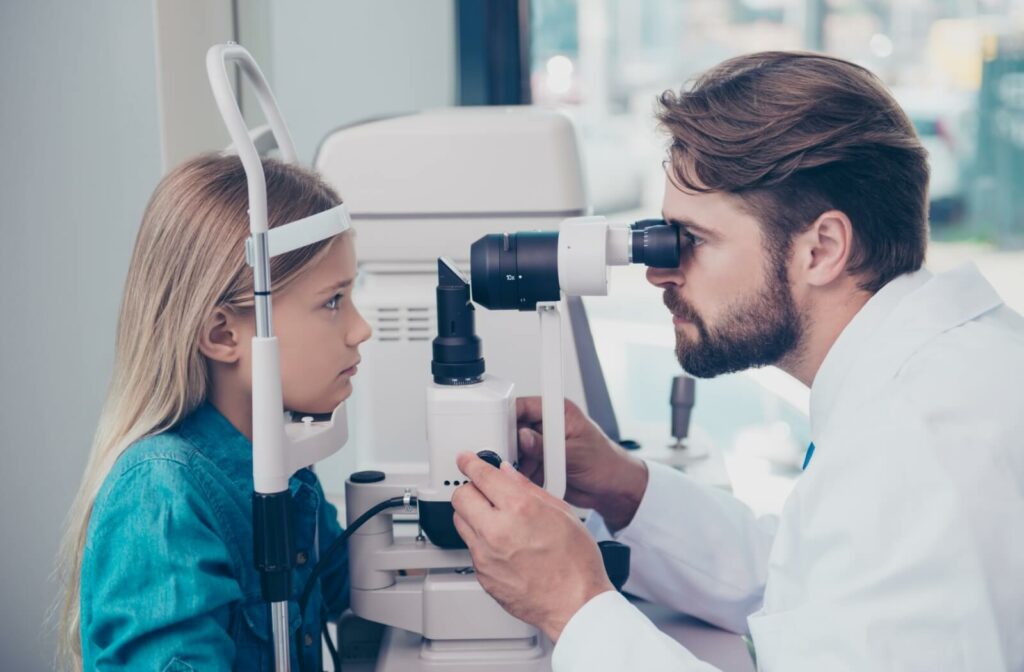You may notice it when you’re driving because the street signs ahead look fuzzy. Or maybe your child mentions they can’t quite see the board at school. This blurry distance vision, known as myopia or nearsightedness, can leave you wondering if it will continue to change over time. Properly understanding your vision is the first step, and learning what to expect from an eye test can demystify the process.
Myopia can progress, particularly during childhood and adolescence, but its progression often slows or stops in early adulthood. Understanding why it happens and how to manage it can help you and your family protect your eye health. We focus on innovative solutions to support your child’s vision for the future.
What Is Myopia or Nearsightedness?
Myopia is a common vision condition that makes distant objects look blurry while close-up objects stay clear. It occurs when the shape of your eye causes light to focus incorrectly. According to the American Optometric Association, myopia is a refractive error that affects nearly 30 percent of the U.S. population. If your child is struggling to read signs or see a screen clearly, a visit to an eye doctor can help determine whether myopia is the cause.
How Myopia Affects Your Vision
When you have myopia, your eyeball might be a little too long from front to back. The cornea could also be too curved. This shape causes light to focus in front of the retina rather than directly on it, which creates the blurry view of things far away.
Common Signs of Myopia
You might notice a few signs that point toward nearsightedness in your children. These can appear slowly over time and may include things like:
- Difficulty seeing distant objects clearly
- Frequent squinting to try to see better
- Headaches from eye strain and misalignment
- Fatigued eyes
Why Nearsightedness Can Progress
Several factors can cause myopia to get worse, especially during childhood and the teenage years, when eyes are still growing. Knowing these factors can help your family take proactive steps toward managing eye health.
Your Family History and Genetics
Your genes play a part in whether you develop myopia. If one or both of your parents are nearsighted, your own chance of developing it goes up. Regular eye exams with an eye doctor are a great way to monitor your family’s vision.
The Role of Close-Up Work and Screen Time
Spending a lot of time on activities that need close focus, like reading or using digital devices, can contribute to myopia progression and lead to symptoms of digital eye strain. This is sometimes called visual stress. It can help to take frequent breaks to look at distant objects and give your eyes a rest.
The Impact of Time Spent Outdoors
A lack of time spent outdoors may also contribute to myopia. Studies show that exposure to outdoor light can be good for eye development and may reduce the risk of nearsightedness. This is especially true for children.
How Age Affects Myopia Progression
Myopia often begins and changes during certain stages of life. While it usually follows a common path, everyone’s experience can be a little different.
Development in Childhood and Teen Years
Nearsightedness is often first found in school-aged children, typically between 8 and 12 years old. During these growth years, it’s common for a child’s prescription to change as their eyes continue to develop, which is why regular children’s eye exams are so important.
At What Age Does Myopia Stop Progressing?
For many people, myopia tends to become stable in their early 20s. Once the eyes stop growing, the prescription often stays the same for years. However, this isn’t the case for everyone.
Myopia Changes in Adulthood
While it is less common, some adults may find that their myopia continues to change. This can be due to ongoing visual stress from work or certain health conditions. An annual check-up with your eye doctor helps track any changes to your vision.

The Importance of Myopia Management
When myopia progresses without proper management, it can become more serious. Proactive care focuses on slowing this progression and supporting your long-term eye health.
What Is High Myopia?
High myopia is the term for a more significant level of nearsightedness. When myopia progresses to this point, it can increase the possibility of other eye health issues later in life, as severe myopia increases the risk of several sight-threatening conditions.
Potential Long-Term Eye Health Concerns
Unmanaged high myopia is connected to a greater chance of developing other conditions. These can include:
- Retinal detachment
- Glaucoma
- Cataracts
How to Manage Myopia Progression
Fortunately, there are several ways to correct blurry distance vision and help slow the progression of myopia. A comprehensive eye exam is the first step to creating a plan that fits your personal needs.
Corrective Eyeglasses and Contact Lenses
Eyeglasses and contact lenses are the most common ways to correct myopia. They work by refocusing light correctly onto your retina, providing clear vision. With modern frames and lens technologies, you can find a solution that fits both your vision needs and personal style.
Will Glasses Make Myopia Worse?
A common question we hear is whether wearing glasses can make nearsightedness worse. Corrective lenses do not cause myopia to progress; they simply correct the blurry vision caused by the refractive error.
Myopia Control Options
Beyond standard glasses and contacts, there are specific treatments available that aim to slow down the progression of myopia in children and teens. These evidence-based myopia control treatments may include:
- Specialty multifocal contact lenses
- Orthokeratology (Ortho-k)
- Atropine eye drops
- Myopia control eyeglasses
When to Talk to Your Eye Doctor
Regular eye exams are a key part of myopia management for people of all ages. Your eye doctor can discuss personalized options to help you or your child see clearly and maintain good eye health for years to come.
Clear vision is a big part of how you experience the world, from childhood through adulthood. Taking a proactive approach to nearsightedness can make a real difference in your long-term eye health.
At Total Vision Novato, we’re here to support your family’s vision at every stage. Schedule a comprehensive eye exam with our team to discuss a personalized myopia management plan.




